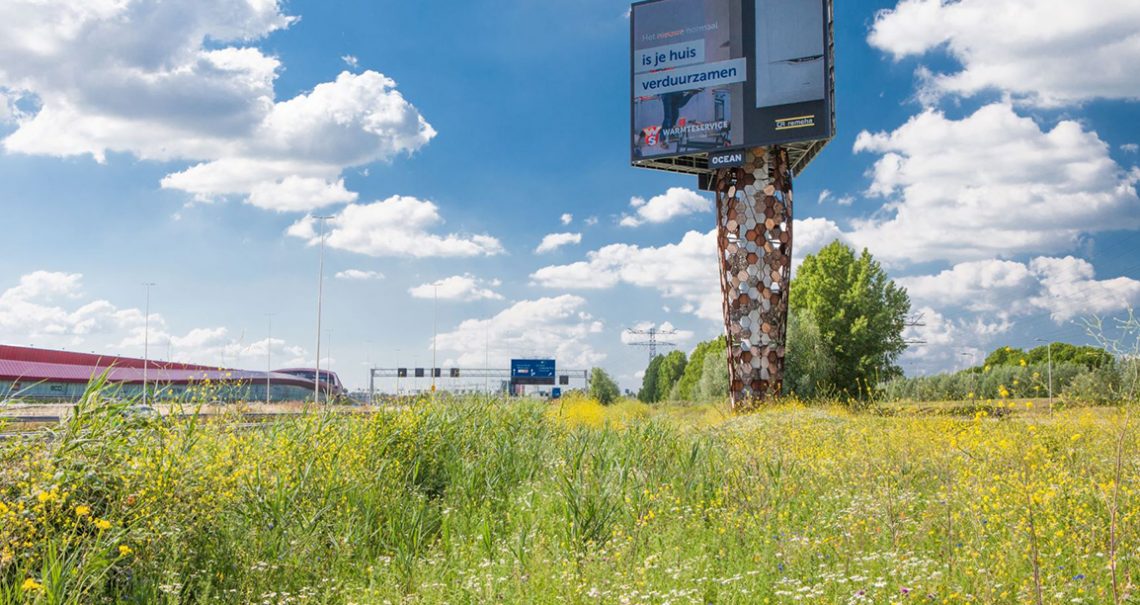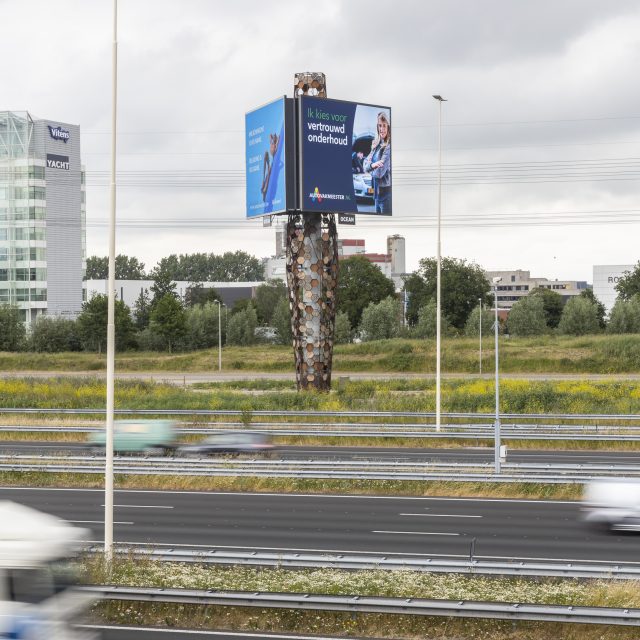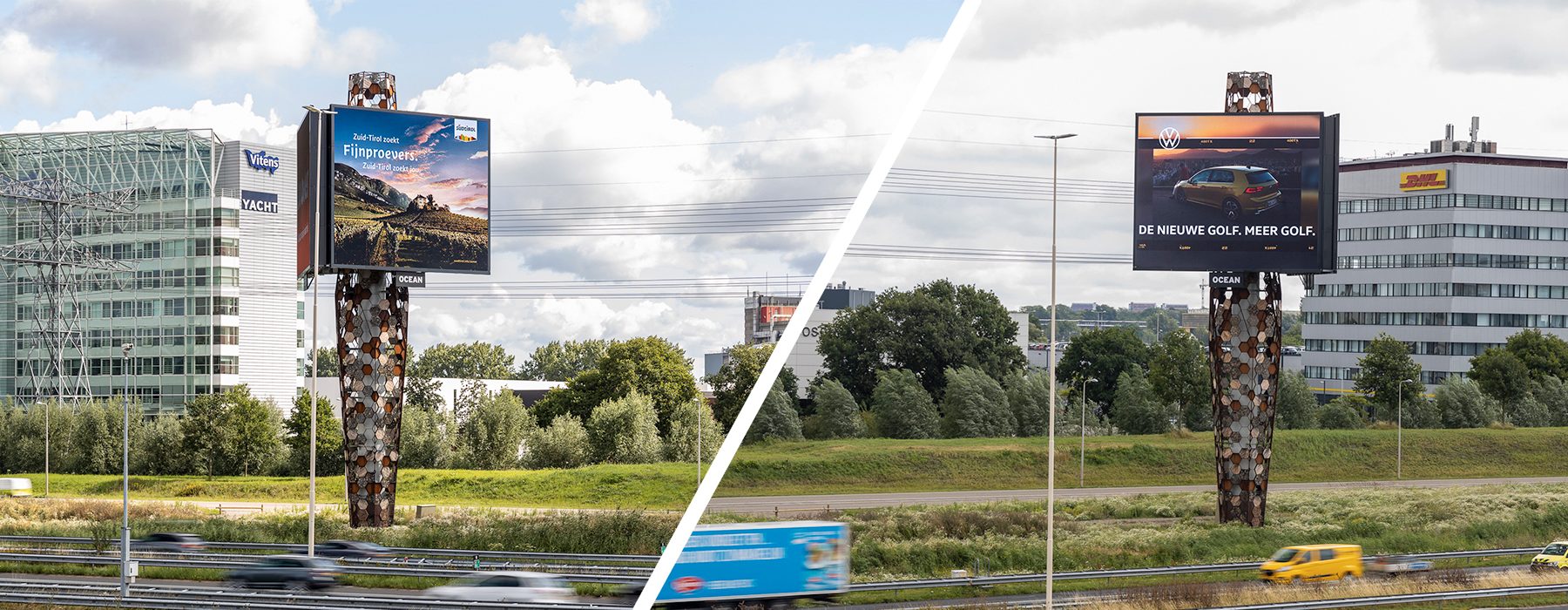Bees are important for biodiversity. Pollination by bees ensures the reproduction of many plant species and thus also the survival of these plant species. The pollination of many fruit and vegetable plants ensures the growth of the fruit and vegetables on the plants and that in turn ensures food production. In short, bees are an important animal species for all of us but unfortunately, they are an endangered species. There are approximately 385 species of (wild) bees in the Netherlands, half of which are endangered.
November 2019
Utrecht

Restoring biodiversity
In city planning, Utrecht is always looking for a combination of functionality and greening the living environment with care for animals and the climate. That is why they are committed to, among other things, the bees. There are currently more than 70 species of bees in Utrecht, including rare species.
The vacant lot between the A2 motorway and Wolfgang Pauliweg, an approach road for Utrecht-West, is the perfect place for a billboard: an elongated plot that is available, surrounded by a plot that is large enough to also create a flower field. It was therefore not difficult to convince Honey Highway of the idea of creating a billboard that was in line with restoring biodiversity. The emphasis of this project is therefore on sustainability and not on advertising, with education as an extra component and an obligation to social return. All items that are high on the agenda of the Municipality of Utrecht.
With all these mandatory components, it was no easy task to develop a billboard that was sound for urban planning in addition to being sustainable. Based on ideas from SAB from Arnhem, a sustainable and original design has been created. A billboard that fits within a fully-fledged landscape design, in which natural values play an important role. The billboard has a landscape-natural theme.
Quote
Flowers and plants in and around the city are important, because insects and animals get a better habitat”
A billboard as a hotel: 200 nest boxes
Just like Utrecht, Ocean Outdoor Nederland wants to create a balance between greenery, colour and modern buildings along the A2 motorway. Together with Honey Highway, the verge has become a nesting place for wild bees, bumblebees and butterflies and the billboard will therefore function as a true hotel for bees and butterflies. The Bijenhotel is a recognisable object that is a new landmark along the A2 motorway.
The billboard has a height of 28 metres and includes a false front with a steel honeycomb structure containing more than 200 nest boxes for bees and butterflies. The nest boxes are made by residents of Utrecht with poor job prospects and are filled with Utrecht pruning wood and FSC chips.
The false front is constructed in such a way that the further up, the more open the front becomes and the top of the honeycomb structure is even completely open. To integrate the billboard into the environment, it was sprayed in a neutral colour.
On top of the billboard there are two digital screens, each 9 x 12 metres in size. These hang high enough so the bees are not bothered by the light spread by the screens. In addition, the screens are dimmed even further in the evening than is prescribed in the guidelines of the Dutch Foundation for Lighting Technology (NSVV).

Flowery landscape
Around the billboard lies a flower meadow of 7000m² with more than 40 species of native flowers with various flowering times. Naturally, the flower mixture that has been sown is suitable for (wild) bees and other insects. The various flowering times allow the bees to find food near their nest all year round.
The plot is a large flowery landscape that is visible from the motorway as a kind of natural, colourful icon.
Sustainability
Sustainability is a top priority at Ocean. More than 75% of the material that makes up the Bijenhotel is recycled. The billboard consists of reused dismantled masts. Sustainable procurement has led to a lot of praise from the region and the sustainability sector, with the result that Ocean has presented as a speaker at a lecture on sustainable procurement.
sustainable durable is the billboard
- More than 75% of the material that makes up the billboard is recycled. Existing dismantled masts have been reused.
- Low energy consumption. The two digital screens have the lowest light emission in the Netherlands. The screens dim automatically as it gets darker in the evening and the screens are switched off at night between 01:00 and 05:00.
- screens are switched off at night between 01:00 and 05:00.
Social return. The nest boxes are made by residents from Utrecht with poor job prospects. - Sustainability. The boxed are filled with Utrecht pruning wood and FSC wood chips.
Quote
“This bee hotel with a 7,000 m2 flower field underneath is a special nature-inclusive design that helps protect bees and contributes to biodiversity. I hope this idea inspires Utrecht residents to do something for bees as well. For example, by planting more flowers in the garden or on the balcony, constructing a green roof or by installing a bee hotel.””
A good collaboration
Ocean and the Municipality of Utrecht have enjoyed a good collaboration for years, which both experience as very pleasant. After the award, both parties appointed a project leader, who worked with multiple disciplines to achieve a proper realisation of this project.
Honey Highway
Honey Highway is an initiative by Deborah Post in which the verges of national motorways, provincial roads, railway tracks and water dikes are sown with flower seeds of perennial wild flowers, tailored to the soil type and region. This way, wild bees can collect enough food for a long period, which makes it possible to hibernate. Honey Highway is committed to restoring biodiversity.
Partners



